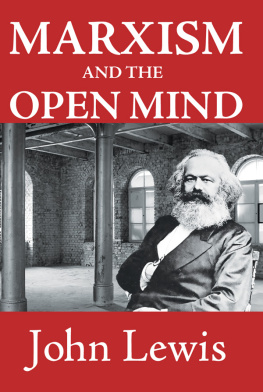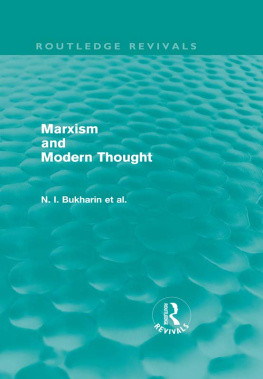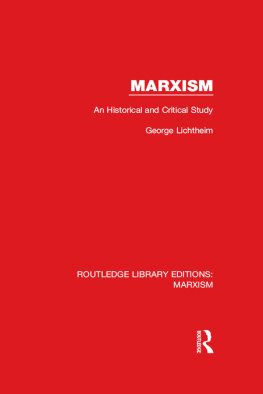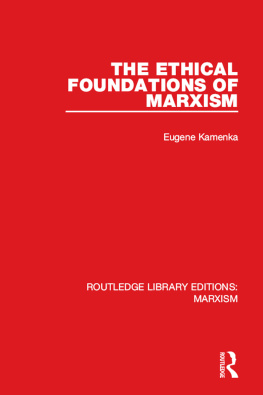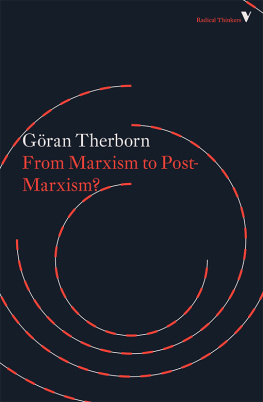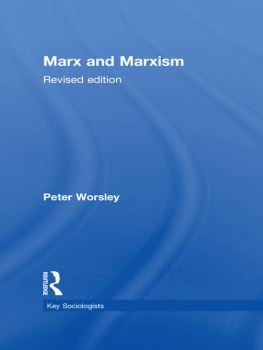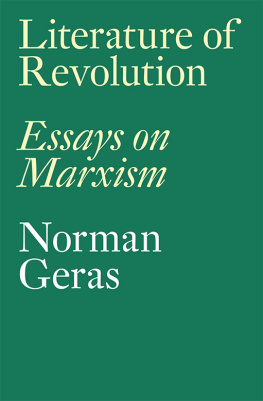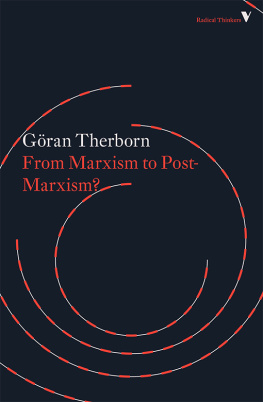First published 2015 by Transaction Publishers
Published 2017 by Routledge
2 Park Square, Milton Park, Abingdon, Oxon OX14 4RN
711 Third Avenue, New York, NY 10017, USA
Routledge is an imprint of the Taylor & Francis Group, an informa business
Copyright 1957 by Routledge and Kegan Paul Ltd.
All rights reserved. No part of this book may be reprinted or reproduced or utilised in any form or by any electronic, mechanical, or other means, now known or hereafter invented, including photocopying and recording, or in any information storage or retrieval system, without permission in writing from the publishers.
Notice:
Product or corporate names may be trademarks or registered trademarks, and are used only for identification and explanation without intent to infringe.
Library of Congress Catalog Number: 2014044064
Library of Congress Cataloging-in-Publication Data
Lewis, John, 1889-1976.
[Marxism & the open mind]
Marxism and the open mind / John Lewis.
pages cm
Originally published: London : Routledge & K. Paul, 1957.
Includes index.
ISBN 978-1-4128-5589-1
1. Dialectical materialism. I. Title.
B809.8.L49 2015
335.4--dc23
2014044064
ISBN 13: 978-1-4128-5589-1 (pbk)
Marxism has since 1918 passed through two phases as far as its general understanding in the West is concerned. At first, and for most of the time, studied neglect or grotesque misrepresentation.
It has been said that the normal English reaction to uncomfortable facts of life, such as Marxism, is an embarrassed but determined silence. That anyone should experience a desire to enquire into ideas as such, and to probe into the motives influencing them, seems extraordinary.
The persistent neglect of Marxism by our intellectual leaders is one of the most shameful phenomena of the long and gloomy twilight of liberal humanism in Britain. What is damning evidence of the general degeneration of intellectual standards in Britain is the fact that for nearly fifty years after Marxs death, when in every other civilized nation except the U.S.A. his doctrines were being seriously debated in academic and intellectual circles, the success of the conspiracy of silence in Britain was ensured, not so much by consciously political motives, as by the plumb ignorance of the conspirators.
After the Second World War, however, and the spread of communism through Eastern Europe and China, it became clear that Marxism was a theory to be reckoned with. The first recognition of the fact in this country was the preparation by Mr. Carew Hunt of a document which was circulated in the Foreign Office and subsequently published as The Theory and Practice of Communism. This, and the pamphlet issued by the United States Congressional Committee on Foreign Affairs in 1948 entitled The Strategy and Tactics of World Communism, were serious studies which went back to the Marxist texts and attempted to present the Marxist theory fairly and objectively. The theory thus set forth has now been recognized by many sociologists as one of the greatest individual achievements of sociology to this day.
Marxism makes no claim to present the world with a closed system. It is offered rather as a working hypothesis to be constantly modified as a result of its application to changing historical conditions. As Engels said: Our conception of history is above all a guide to study, not a lever for instruction after the manner of the Hegelians. All history must be studied afresh, the conditions of existence of the different formations of society must be individually examined before the attempt is made to deduce from them the political, civil-legal, aesthetic, philosophic, religious, etc. notions corresponding to them. But instead of this only too many simply make use of the phrase, historical materialism (and everything can be turned into a phrase), in order to get their own relatively scanty knowledge fitted together into a neat system as quickly as possible. Marxism has therefore always been a changing and developing theory. The very meaning of dialectics is that by applying it in practice effects are produced which must bring about a modification of the theory. Then the changed theory will demand a new application.
It is now realized by an increasing number of scholars that Marx made an outstanding contribution to the theory of social development when he saw society as an unstable equilibrium making for constant change. He attempted to show that three factors were responsible for social developmentfirstly, improvement in technique (from the hand-loom to the textile factory), secondly, the corresponding change in the type of human relationship involved in production (from the self-employed craftsman to the capitalist employed worker), thirdly, the growing economic and political power of a new social group (in this case the employers), which eventually remakes society in its own image. Marx worked this out with a great wealth of detail for the rise of modern industrialism.
What has been lacking in contemporary Marxism is the modification and re-formulation of this theory in the light of historical study, the contemporary economic situation, and the development of modern science. Nature is the test of dialectics said Engels. It is possible to reach the dialectical conception of nature because the accumulating facts of natural science compel us to do so. And in its application to society It is no longer a question anywhere of inventing inter-connections out of our own brains, but of discovering them in the facts. All that the theory can hope to do is to give a general skeleton of the Marxist conception: The proof is to be found in history itself.
What this suggests is the need for a much greater interpene-tration of Marxism and contemporary thought than we have seen as yet. The idea behind these essays is that such mutual influence is possible and desirable and would be of profit to both. Marxism has a contribution to make in many fields, but it is equally true that Marxism has much to learn from non-Marxist thought. If dialectics is a deduction from historical and scientific facts then two things should follow, firstly, history and science as objective studies, ought to become more and more dialectical, and Marxist theory ought to be of assistance in analysing and interpreting the available data. We read the truth more easily if we approach the dialectical character of these facts equipped with the consciousness of the laws of dialectical thought. On the other hand the unfolding of historical and scientific truth should enrich and exemplify Marxism, and at the same time constantly require a development and revision of Marxist theory.
There are, however, grave difficulties in the way of this drawing together of Marxist and non-Marxist thought. The first reason for this is that Marxism, as is well known, is very far from being a speculative theory with no relevance to concrete problems; on the contrary it closely unites practice with theory. It follows that if theory draws near to Marxism its political consequences will become apparent and this may cause embarrassment. As a consequence there may well be a half-conscious reluctance to pursue a tendency of thought which leads in that direction.
For a similar reason it may be felt that the safest and least disturbing kind of philosophy, will be that which confines itself to formal logical studies or purely speculative matters; while in history there will be a preference for descriptive or empirical studies and an avoidance of tendentious theories. It is dangerous to use history to obtain an understanding of the political, social and economic world in which we live, because it tends to produce a belief in the need for change, and this opens the door to socialism.

